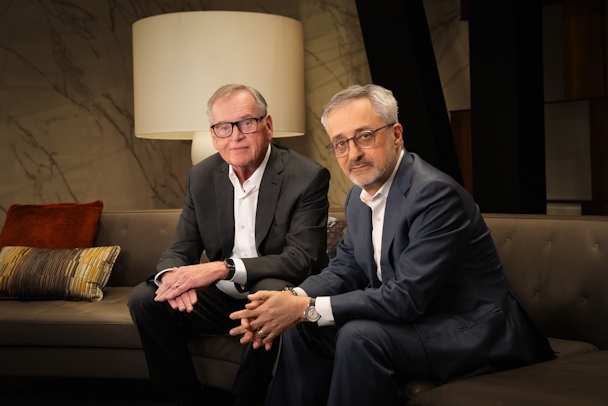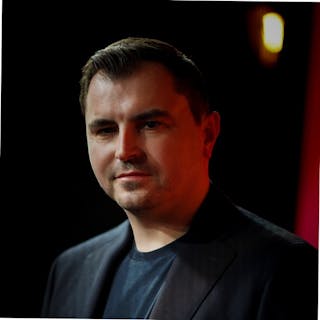What you need to know about Omnicom’s acquisition of Interpublic
The biggest shake-up in the advertising agency landscape in decades is upon us as Omnicom announces the acquisition of IPG.

Omnicom boss John Wren with IPG counterpart Philippe Krakowsky / Omnicom
It’s now official. After overnight leaks, Omnicom has today confirmed that it has agreed to acquire its fellow New York-based holding company Interpublic in a deal that will create the world’s largest advertising agency business if it goes through.
In a joint statement, the two companies said their boards had unanimously approved the takeover of IPG (valued at $10.9bn at the close of trading on Friday) by its larger competitor (Omnicom was worth $20.2bn at Friday’s close). Subject to regulatory approval, the combined group will have net revenue of more than $20bn.
This would make it the biggest advertising holding company in the world in revenue terms, shifting the balance of power to the US from Europe, where London-based WPP and Paris-based Publicis Groupe have been battling for supremacy. Just last week, Publicis was touting the news that it was finally about to usurp WPP and become the number-one holding company by the end of 2024.
Want to go deeper? Ask The Drum
“This strategic acquisition creates significant value for both sets of shareholders by combining world-class, highly complementary data and technology platforms enabling new offerings to better serve our clients and drive growth,” said John Wren, chairman & chief executive of Omnicom.
“Our two companies have highly complementary offerings, geographic presence and cultures,” added Philippe Krakowsky, Interpublic’s chief exec. “We also share a foundational belief in the power of ideas, enabled by technology and data. By joining Omnicom, we are creating a uniquely comprehensive portfolio of services that will make us the most powerful marketing and sales partner in a world that’s changing at speed.”
Wren will remain chairman & chief exec of Omnicom while Krakowsky will serve as Omnicom co-president and chief operating officer alongside current Omnicom COO Daryl Simm. Krakowsky will also be co-chair of the ‘Integration Committee’ established to thrash out the practicalities of the merger and the implications for the two companies’ stables of networks and agencies. Omnicom’s flagship shops include BBDO, DDB, TBWA, OMD and PHD while IPG counts McCann, FCB, MullenLowe and IPG Mediabrands among its marquee names.
Despite sharing similarly storied histories, the two holding companies’ recent fortunes have been contrasting. Omnicom reported 6.5% organic growth year-over-year in its Q3 figures, but IPG’s revenues have been flat, and it is selling off the digital agencies Huge (already gone) and R/GA (on the way – unless this deal offers a buzzer-beater reprieve) in order to improve its balance sheet. “I don’t think there will be too much surprise IPG is being sold given both its operational and share price performance and recent sales of agencies,” wrote the analyst Ian Whittaker.
Haven’t we seen this movie before?
Omnicom was close to a similarly transformative deal a decade ago when it agreed to a stunning $35bn mega-merger with Publicis Groupe.
Announced in July 2013 with a celebratory photo call between then-Publicis chief executive Maurice Levy and Omnicom counterpart Wren in front of the Arc De Triomphe, the so-called “merger of equals” ultimately descended into a power struggle, and the deal collapsed in May 2014.
Advertisement
It’s a cautionary tale that while the Omnicom-IPG merger has been announced, replete with the customary shot of new partners Wren and Krakowsky together, there will still be much to unpack behind the scenes before any agreement becomes official.
The two parties say they expect the deal to close in “the second half of 2025”.
What hurdles could stand in the way?
As the breakdown of the Publicis Omnicom merger demonstrated, deals of this scale are not straightforward to complete no matter the initial willingness of the parties involved.
Holding companies are rife with internal politics, with individual agency brands effectively competing with each other for self-preservation as their behemoth parent companies are squeezed by budget-cutting clients or encroaching tech giants. This has given rise over the last decade to the age of holding company reinvention or – to put it less euphemistically – rationalization. At IPG, this has most recently manifested itself in R/GA being put up for sale and Huge being offloaded to private equity firm AEA Investors last week.
“Putting more and more separate branded businesses into big silos is not an option in a deal of this kind,” says Matt Lacey of Waypoint Partners. “Therefore, we are likely to see significant consolidation of agency brands over the next few years, akin to what WPP has been doing.”
Advertisement
Omnicom and IPG will no longer merely need to work out how to get their own houses in order, but each other’s. This will mean settling issues such as the conflicts of interest that will inevitably arise from their agencies sharing clients in the same categories and the political minefield of who gets the top jobs. (The battle to choose the chief finance officer was said to be one of the stumbling blocks in the Publicis-Omnicom negotiations). Perhaps, though, this is where having a clear senior partner will make the process easier than the always fanciful notion that a “merger of equals” could be achievable à la the doomed Publicis Omnicom Group. And this time, Omnicom’s Phil Angelastro has already been confirmed as CFO.
Both firms being headquartered in the same city may help with the practical challenges that any such merger presents (people, corporate structure, tax, offices, culture etc), but the US dominance may add to the deal’s difficulty. As Whittaker says: “Don’t assume this deal will get regulatory approval ... the Republicans view the advertising/agency industry not as a friend and the new administration [looks] as though it will continue, or accelerate, the Biden administration actions.”
How will rivals react?
Having gone to the trouble of recruiting Snoop Dogg to celebrate becoming the holding company top dog, the team at Publicis Groupe will not be thrilled at such news dropping this hot only a matter of days later. Until this point, the industry-leading growth of the Arthur Sadoun-led firm had undoubtedly been the holding company story of the year. Expect Publicis now to push the narrative that it has grown to outstrip its competition without having to buy any of them.
Suggested newsletters for you
Curiously, a report did surface on the financial blog Betaville last week suggesting Publicis was lining up a bid for IPG though that rumor was ultimately unsubstantiated.
Will this trigger a wave of consolidation across the marcomms space?
Many eyes will turn to WPP, likely dethroned either by Publicis, this new entity or both as the world’s biggest holding company after years at the top, in expectation of a response. But perhaps some of the most interesting activity will be a rung down from the super-sized holdcos.
As The Drum columnist and Green Square partner Barry Dudley puts it: “The Vivendi break up feels like one can become four, as an undervalued group spins itself out. While Omnicom and IPG coming together is more 1 + 1 equals 1.75.”
